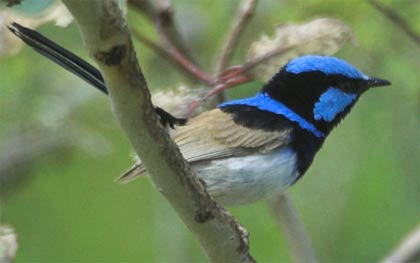The negligent mother's mother relied on
Child care is very expensive, even in the world of flying species. Some smart and sloppy moms have saved their energy and strengthened themselves by relying on others who look " free ".
Recent research shows that the females of the species of the fairy god (Malurus cyaneus) are too stingy to supply eggs with nutrients in their womb. Instead, they rely on other birds that will compensate for this deficiency by supplementing the nutrition after the chicks hatch.
As a result, the energy saved in the life of the red mother will help them have more opportunities to reproduce. And that also means that females have more chicks.
Distributed mainly in southeastern Australia, the fairy or twin-headed wrenches, or kissing pants in the group, in which a male leader will control breeding opportunities and from 1 to 4 males will help themselves "sterilization" to serve as a nanny for young children. These helpers are usually the son of the previous breeding season.
"The mother bird often steals very effectively the efforts of its children and gives energy to laying more babies in the future," said research team member Rebecca Kilner from the University of Cambridge.

The maidess is usually male.(Photo: LiveScience)
Why do people discover this?
Scientists have long known that red-eyed parents often have maids who care for their children, but marvel at the fact that these children don't seem to be healthier than those who don't "osin" care.
In a series of experiments, by exchanging eggs between " maids " teams and teams with only fathers and mother birds, they found the answer.
It turns out, the females in the " osin " groups produce eggs less than 5% and have a smaller percentage of yolk as well as fewer nutrients, resulting in their offspring being smaller than the others. The team has no maids.
Researchers do not understand what led the children to do so, despite the idea that the servant will become the dominant male when the current child leaves the nest.
T. An
- Every woman who is old is like her mother
- Video: The mother dog digs the burial pit of a child dying from hunger
- Mother bears teach baby bears in love
- Handy product for young mothers
- Mother smoking, easy to get angry
- 8:25 am morning is the most stressful time for mothers
- My mother is taller, I am stronger
- The mother finches prioritize boys more than girls
- The mother does not recognize her
- Mother often laughs, children have less allergies
- You can apply the creation of babies from a father and a mother
- Newly born monkeys wrapped tangerines with their mothers
 Animal 'suffering' after hibernation
Animal 'suffering' after hibernation Why do goats climb well?
Why do goats climb well? Scientists were surprised to see chimpanzees eating turtles
Scientists were surprised to see chimpanzees eating turtles Giant catfish died deadly due to drought in Thailand
Giant catfish died deadly due to drought in Thailand